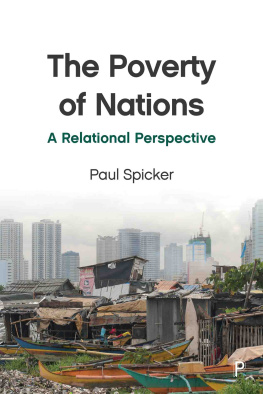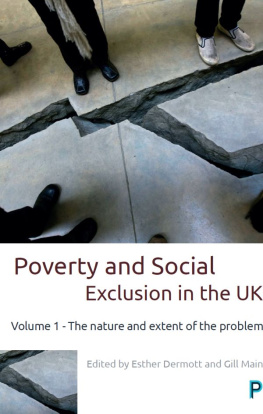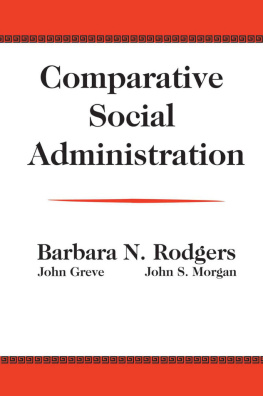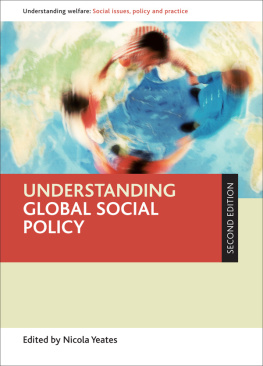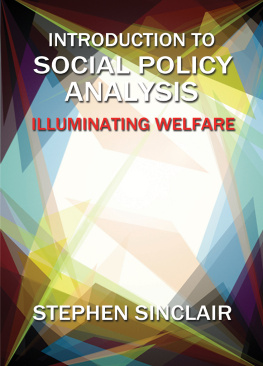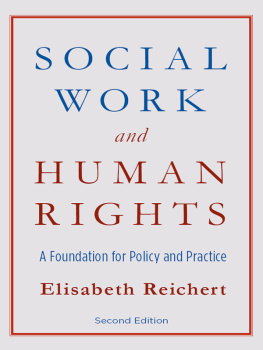From Pauperism to Human Rights
The existence of material poverty in a comparatively wealthy country is socially wasteful and morally wrong. This idea has been central to social policy from Tudor times to the present day, although its application has varied with changing economic situations and philosophies. Taking the continuing battle against this form of social injustice as his theme, Brain Rodgers has made a case-study of a social process. He demonstrates the formation of social policy, and analyses the interaction of policy and practice, of social need and administrative necessity.
This volume covers the period up to the introduction of social insurance, which Rodgers describes as the end of the beginning, but revolutionary though this was, it did not succeed in achieving the complete abolition of poverty; neither did the Beveridge solution of 1948, despite social optimism in his time. The country still houses pockets of dire need, not entirely catered for by the Welfare State, and new studies have thrown some doubt on the applicability of the Beveridge solutions to the needs of the sixties.
This book was first published in 1968.

First published 1968 by Routledge
This edition published 2006 by Routledg
2 Park Square, Milton Park, Abingdon, Oxon, OX14 4RN
Simultaneously published in the USA and Canada
by Routledge
270 Madison Ave, New York NY 10016
Routledge is an imprint of the Taylor & Francis Group
Transferred to Digital Printing 2007
1968, 2006 Brian Rodgers
Typeset in Times by TechBooks
All rights reserved. No part of this book may be reprinted or reproduced or utilised in any form or by any electronic, mechanical, or other means, now known or hereafter invented, including photocopying and recording, or in any information storage or retrieval system, without permission in writing from the publishers.
British Library Cataloguing in Publication Data
A catalogue record for this book is available from the British Library
Library of Congress Cataloging in Publication Data
A catalog record for this book has been requested
ISBN 0-415-38290-4 (Set)
ISBN 0-415-38291-2 (Volume 1)
ISBN 978-1-136-62090-4 (ePub)
Publishers Note
The publisher has gone to great lengths to ensure the quality of this reprint but points out that some imperfections in the original book may be apparent.
First published 1968
by Routledge & Kegan Paul Ltd
Broadway House, 68-74 Carter Lane
London, E.C.4
Printed in Great Britain by
Northumberland Tress Limited, Gateshead
Brian Rodgers 1968
No part of this book may be reproduced in any form without permission from the publisher, except for the quotation of brief passages in criticism
SBN 7100 4031 8 (C)
SBN 7100 4027 x (P)
To my Wife
Those who work in universities are always in debt to their colleagues for inspiration, criticism and plain straightforward help. It is essential to the whole concept of a university that this should be so. I am very conscious of this, and the tangible and intangible help that I have received from historians, lawyers, economists, sociologists and even from specialists in arts subjects like English is immense and cannot really be written down. There are, however, some whose help has been direct and whom I would like to thank directly, Kathleen Jones (now of the University of York) is one of these. She not only persuaded me to write this little book, but she has always been a person who was ready for discussion, and she could be relied upon for trenchant criticism at all times. There is, of course, also my wife who has not only read this manuscript for me but has also read many others and whose comments are a real necessity for a careless writer like myself. I would like, too, to thank my colleague, Paul Wilding, who read the manuscript very thoroughly and at great speed, made some very important points and helped in the trying task of checking references.
Mrs. Muriel Cocker, who typed the whole from an extremely untidy manuscript, deserves a very special mention, for not only is she a very good typist but she is also a truly co-operative person who is imperturbable in the face of alterations and corrections.
B.R.
The study of social administration is fundamentally the study of social policy, how it came to be in the developed communities of Western society, how it grew and how it succeeded in achieving the ends which it set out to achieve. Western society has been specified deliberately, for though something which can be called social policy is present in most communities, what we understand by the phrase is conditioned by the society in which we live. Within the framework of our own society there are, however, factors which must be present before social policy can come into being and which are, in a way, prerequisite to the development of policy.
Firstly, it is necessary that a problem should be known to exist. This may appear to be a truism but when we look at the history of this country we soon realize that this is extremely important. For instance, Lord Eldon, who, as Lord Chancellor of England, was an important figure in the period after the Napoleonic wars, stated on one occasion that popular education was an extremely undesirable thing. Obviously he was influenced by a fear of popular knowledge which would not be acceptable today. As late as the 1870s, there was a school of thought in this country which regarded education as something that should be subject to the ordinary processes of supply and demand. In many of his novels Thomas Love Peacock (perhaps unrepresentative in the extremity of his reactionary views) sneers with brilliant and caustic sarcasm at the various attempts made to improve the general standards of education. In other words the influential Eldons and Peacocks were insensitive to social wrongs which would have outraged Englishmen of later years. On the other hand, it must also be realized that some problems were not seen because the problems concealed themselves and the people who suffered were little known. Irish emigrants to the United States, for example, suffered innumerable hardships and were the victims of the most callous cruelty for a long time before influential people in the country knew much about them. Children, too, suffered frequently from callousness and from cruelty on the part of their parents; but because there was no machinery by which this suffering could be brought to light, the situation was not recognized. Statistics about life and social conditions in England in the earlier part of the nineteenth century were woefully inadequate and few knew what hardships were being suffered.
This leads to the second prerequisite, which is the realization that something can be done to solve social problems. The concept of progress is comparatively new and only slowly from about the fifteenth century did people begin to think of social change as both possible and desirable. Even in the nineteenth century many thought of the golden age as being in the past, not the future. To recognize that a wrong exists and to feel or to know that something can be done about it is, however, not much use unless one knows something more specific about the problem with which one is dealing. Our forbears in the eighteenth century did not know, for example, whether the population of England was rising or falling, and there were frequent discussions about this as a particular kind of social problem of its day. There was a census in 1801, but this was unreliable and the first effective census in this country did not take place until the year of 1811. Furthermore, it was not until the compulsory registration of births, marriages and deaths that we were able to obtain reliable information about such important things as the infant mortality rate and mortality rates generally. A very important development in our history was the appointment of Dr William Farr as the keeper of abstracts to the Registrar General in 1837. Social surveys, if we use the word in a very broad sense, had been undertaken in the eighteenth century and we still have the remarkable and extremely impressive records of John Howards work on the prisons and Edens great study of the Poor Law system. Dr. Percival in Manchester had even made a study which was very like some that are being undertaken today. Something like a statistical movement took place just after the Napoleonic wars, and in the 1830s a number of towns followed Manchester in starting statistical societies to collect local information and to study certain problems peculiar to the area. The British Association had been founded in 1833, and included as one of its original departments a Section F which was concerned with the collection and discussion of social data. Nevertheless, many of these surveys had an aura of nineteenth-century preconceptions about what society ought to be and they were not always dominated by what we would now regard as objectivity. In the study of poverty, for example, there was a marked assumption during most of the nineteenth century that the extent (and, by implication, the cause) of poverty was known. In fact, it was not until the century was nearly over that accurate figures became available, suggesting that the incidence of poverty in this country was considerably higher than anybody had ever expected and that its causes were different from what was generally supposed. In England, moreover, even when social problems were recognized and solutions sought and applied, reformers often acted in advance of important scientific discoveries which were to take place in the near future and which could alter our whole attitude towards the solution of the problem. A clear example of this is the introduction of the first comprehensive Public Health Act in 1848, which was about a decade before Pasteur made his great bacteriological discovery and before Lister explored the field of antisepsis. As a result of this the Public Health movement was bedevilled for some years by a fruitless discussion between those who maintained that health was a matter of medicine and those who thought that it was a matter of civil engineering.




